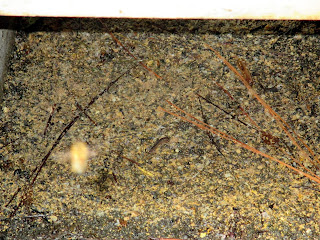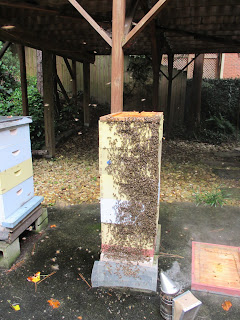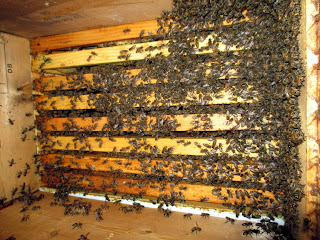When I went to Lithuania, I committed to the trip months ahead of time. I also evaluated what I needed to take, what should go with me, what could I leave at home. Something major, major would have to happen for me to change my plans.
The bees are still there this morning, but they are ready to go. I should have seen it. I should never have put the robber screen on - I think they started planning then.

While I can't find anything about absconding in Seeley's books, Malcolm Sanford (Keeping Honey Bees) says, "Absconding rarely occurs in colonies in temperate regions where European bees are usually kept, but it may occur if colonies are under threat from disease, pests, or depletion of forage (pollen, nectar, or water)."
The Complete Idiot's Guide to Beekeeping doesn't discuss absconding but defines it as "Absconding resembles swarming except that no bees are left behind in the parent colony. The entire colony leaves its hive."
I can't find any description of preparation to abscond. Usually in my experience the bees take all the honey. There is one honey super still on this hive unless they emptied it this morning - which is not typical of absconding unless their tummies are full with the other honey supers. Just like in robbing, there are shards of wax below the hive. These are shards from brood frames and are brown rather than white:
You can see them under the hive below the screened bottom board.
And why are the shards brown? Because before a hive absconds, they empty the hive. This means that they leave no or very little brood behind. I've seen them carrying out larvae over the past few days and congratulated myself on having such a hygienic hive.....but that's not what they were apparently doing....
So now I know that before absconding you'll see young larvae being carried out, typically they empty the honey cells, and no pollen bearing bees are coming into the hive. As a matter of fact, I think the bees out flying are scouts and are dancing to advertise new space. I saw several rather frantic dances like Seeley describes taking place on the front of the hive.
The bees flying in this morning were light, carrying nothing, and only doing a scout job. The working bees this morning were the ones in the hive, still removing larvae.
One theory would be that these bees are sick and that's why they are absconding, but it looks more like they were clearing out the young to leave.
Last night before I went to sleep, I read on Beemaster that one way to stop absconding would be to do what one might also do when hiving a swarm: put a queen excluder between the hive and the bottom board so that the queen probably can't leave.
So that's what I did a few minutes ago. I took the hive down to the bottom board where there were tons of removed larvae. BTW, I looked very closely at the larvae both in person and with the zoom on my Picasa viewer at the computer. I do not see any Varroa mites. I think these are healthy bees, sacrificed to the hive's wish to abscond.
I put on a queen excluder (I do actually own several even though I never use them in the hive. I use them to drain cut comb honey!).
This should hopefully stop them. I checked the bottom board carefully and did not see the queen. Unless she's really skinny, she should not be able to go through the excluder and the hive will stay. Beemaster says I should leave the excluder on for at least three days.
If this hive survives, then the disruption should help with a varroa problem in that the bees have interrupted the brood cycle and thus the Varroa cycle as well.
I totally tore off the robber screen in case that was what was bothering them.
So maybe the train has left the station, but maybe I put a big enough boulder on the track to keep the departure at bay. We'll see.
P.S. I was at home on a phone appointment at 11:30 AM when the bees started the swirl of a hive that is leaving. They swirled and swirled, but didn't leave since the queen couldn't come through the queen excluder. They are still anxiously flying around the hive but haven't left. I hope I did the right thing.
There is no nectar flowing in Atlanta and even though the statistics say it has rained on 38% of the past 224 days this year - greater than 1/3 of the days, it seems to me as if it rains almost every day. If they leave, there are no better areas for nectar collection around, so best if they don't. If they are leaving because of disease, then who knows if it would be better for them not to be here.













































